In the original story of “The Ugly Duckling”, there’s a moment where the despondent and rejected fluff ball sees a flock of migrating swans overhead. He recognizes them as his people, a group where he will no longer be the teased and abused outsider. The ugly duckling is too small to join the migration and waits out the cold winter until he is fully grown and the flock returns.
Have you been through a lonely winter like that–where you knew who you’d be at home with, but for reasons outside your control, you weren’t ready to join in yet?

Unlike the ugly duckling who just has to wait and grow a little, joining the creative flocks I so admire requires deliberate trial and error. I saw one of those flocks pass over head sometime in undergrad, when I did half of my BFA work in Parsons’ Design & Technology program. It was a struggle to keep pace with my more technically savvy classmates. I saw work that inspired me greatly. I learned that interactive and computational technology could gracefully accomplish what I awkwardly manipulated documentary photography to do.
It’s been years of cold, lonely winter where I applied the experience and interaction design skills I learned in the Design and Technology program to physical and analogue settings, but I struggled to acquire the technical prowess I craved.
Winter Thawed, the Flock Returned
And that flock was the School For Poetic Computation. This past Spring, I was very happy to find myself with the heap of beautiful swans at the SFPC (or would it be a stack?).

Illustration by Taeyoon Choi
SFPC describes itself as school for artists taught by artists. Not everyone attending was an artist strictly, but everyone optimistically embraced creative expression through computation as a means and an end. The school ran on open source code, open finances, and to a large extent an open curriculum.
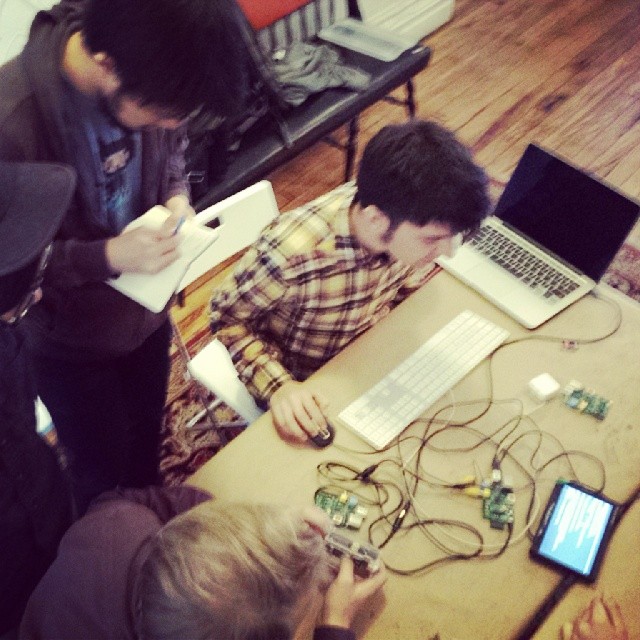
Getting a Raspberry Pi up and running with Jonathan Dahan
SFPC can’t teach you to be better at technical execution, much like learning to write poetry won’t improve your punctuation or grammar. SFPC can’t position you for a career in any direct and obvious way. And as far as I can tell it probably can’t fix shoddy thinking, either.
From the SFPC Mission Statement:
This is not a program to get a degree, there are large programs for that. This is not a program to go for vocational skills, there are programs for that. This is a program for self initiated learners who want to explore new possibilities. This is a program for thinkers in search of a community to realize greater dreams.
What SFPC can do is deepen your appreciation of computation as an expressive medium, get you engaged with a community of practitioners, and leave you with a host of new possibilities to explore. You gain a deep appreciation of the potential of code to do profound and beautiful things.
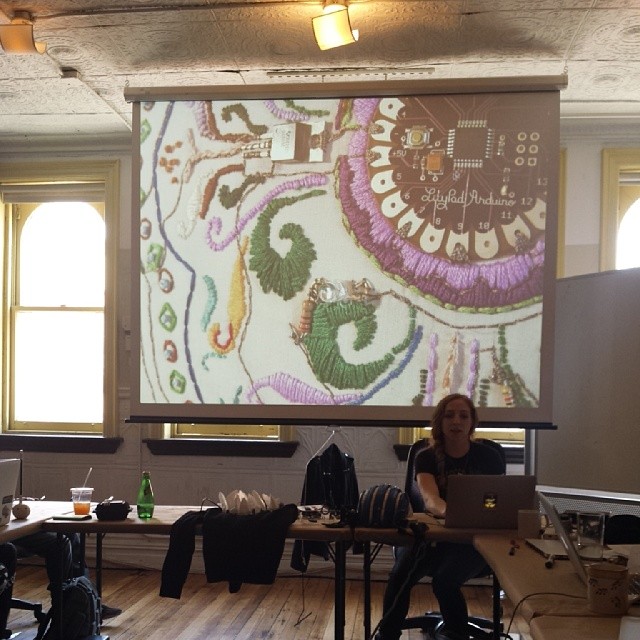
Becky Stern shares her Adafruit creations
My opening presentation was on tenements and the borscht belt. My closing presentation was about my mom’s domestic textile arts practice. It was all fine and welcome. I’m not sure what other technology intensive would look at these contributions and see a swan at work rather than an ugly duckling. And how did my presentations relate to what I actually worked on during the two weeks? Let’s just say it was all pretty poetic.
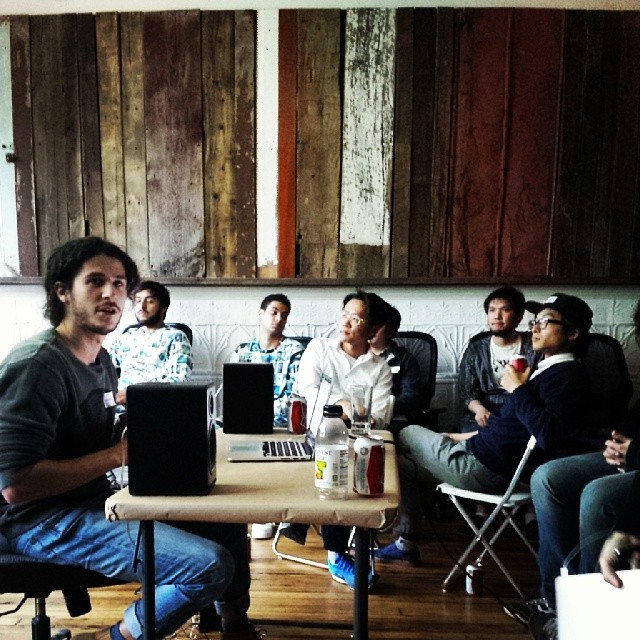
Opening presentations at SFPC
Why SFPC in Particular is Awesome
Radical Transparency in Finances
This goes along with the artist school mentality. Expensive education on endeavors of unclear practical application and material benefit is inherently an exclusive pursuit of the privileged. SFPC aims to be accessible while being realistic about what it takes materially and financially to create a supportive community of practitioners. Commitment to radical transparency in finances ensures an ongoing, rigorous engagement with how to do this. Artists and money–sometimes it’s just not about the money.
Everyone Was There For The Right Reasons
The openness, curiosity and supportive disposition of the cohort bowled me over. It shows clarity in messaging on the part of SFPC (or just the right opacity) and a great screening process.
Packed Schedule, Yet a Flexible Approach to Learning
There was always lots of brainpower in the room, between the core staff, the guest lectures, and the cohort of participants. The planned schedule gave us tons to work on and be inspired by, but there was also a spaciousness about what the group gravitated toward and needed. What was taught very much responded to the group’s momentum. The brainpower available meant that specialized workshops could happen on the fly. If you didn’t know what to work on at any one moment, there was bound to be something going on or someone who could use a hand.

Controller gloves created in Kaho Abe‘s workshop
What the Program Did For Me
Having toiled mostly alone to learn tech stills for the past few years, it was incredibly comforting to arrive at SFPC and realize the extent of what I had accomplished. It’s easy to underestimate what you know when it’s just you and the whole contents of the internet to judge yourself against. The concepts I managed to master on my own were fairly simple, like nested for loops and version control systems, but in a social context where the background and expertise of the participants varies widely, it was impossible to second guess the utility of what I had taught myself. I gained a lot of confidence to simply keep it up. It’s hard to think you’re doing something wrong when Zack Lieberman is searching Stack Overflow to answer your questions and testing some of the same possibilities you did (albeit much more quickly and elegantly).
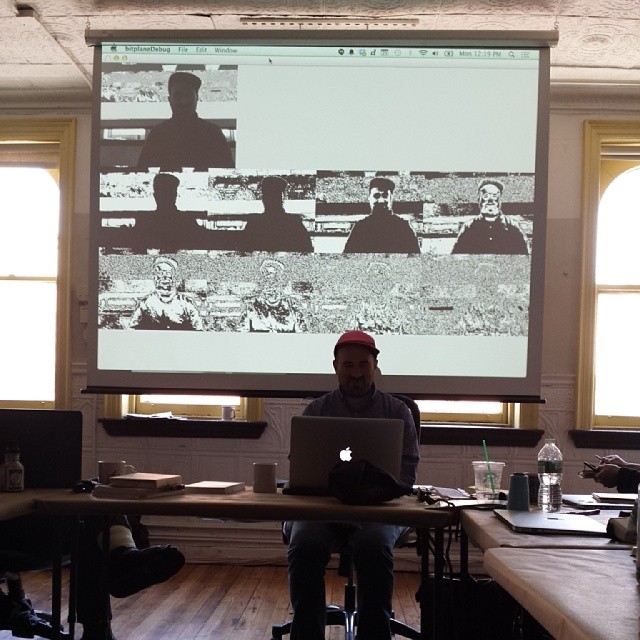
Zach Lieberman demonstrates bit planes
I have a host of new tools and concepts to play with. I would never have expected that I would spend as much time mucking around with Python as I did, for example. It was also incredibly fun to get my first Raspberry Pi working and play around with routers and mesh networking. I have a laundry list of fresh reading and tinkering to do that will fuel my creativity for some time to come.
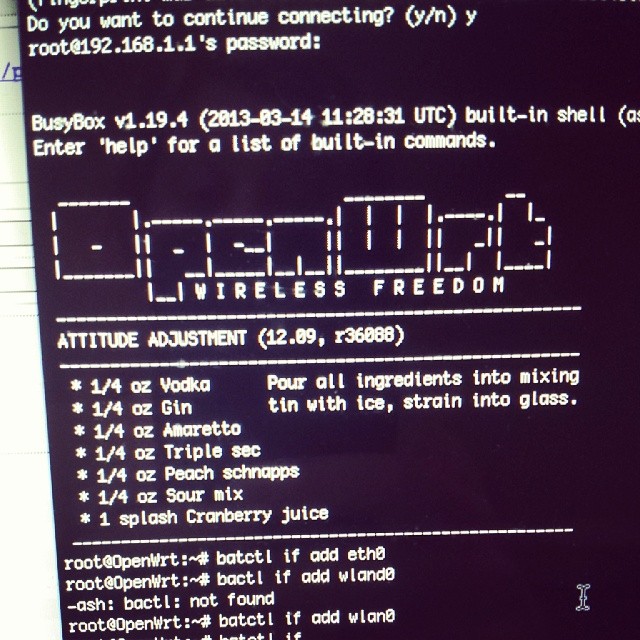
My router served me up a drink recipe in a workshop with Sean McIntyre
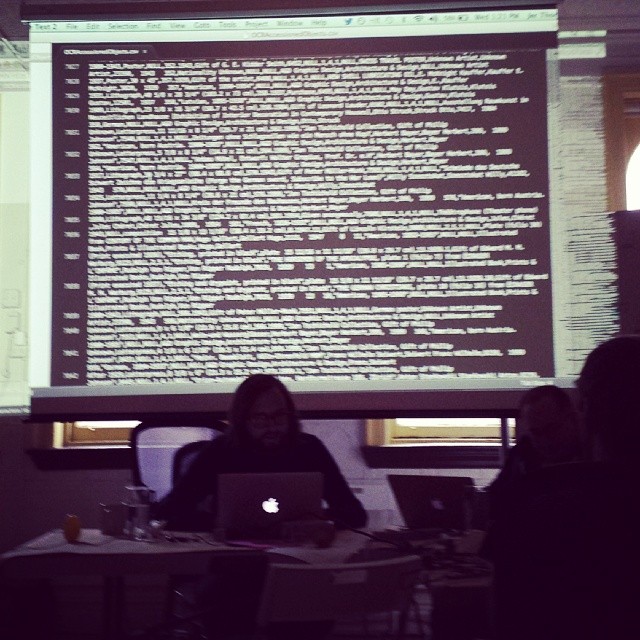
Beautiful, messy data–presentation by the Office Of Creative Research.
So what’s next? More SFPC picnics, I hope! And more Python for me. I’ve been polling my friends in urban policy and historical research for data sets to play with.
Sfpc picnic begins. Fort greene park between the tower and tennis court. @sfpc_school reunion. pic.twitter.com/GhZf4HdVCh
— Taeyoon Choi (@tchoi8) June 8, 2014
An exciting side note: we did our thing where Rancid did its thing. Check out this music video shot in the very room where we made 1 bit computers and rained 3D squirrel in virtual space. Thanks to Orbital for hosting us!
Birds of A Feather
SFPC is going through something of an ugly duckling phase itself. Amid the many programming intensives, SFPC is the odd one that thinks poets have all the answers and that hireability isn’t necessarily a sign of success for a technologist. It dreams of having a flock of its own, a collection of artist schools where we can go from one affordable intensive to another learning what most go to grad school for but with more joy and less overhead. What will creative technology education be like when SFPC finds its flock of swans?
–
Sign up for SFPC’s email list on the website to hear about upcoming sessions.